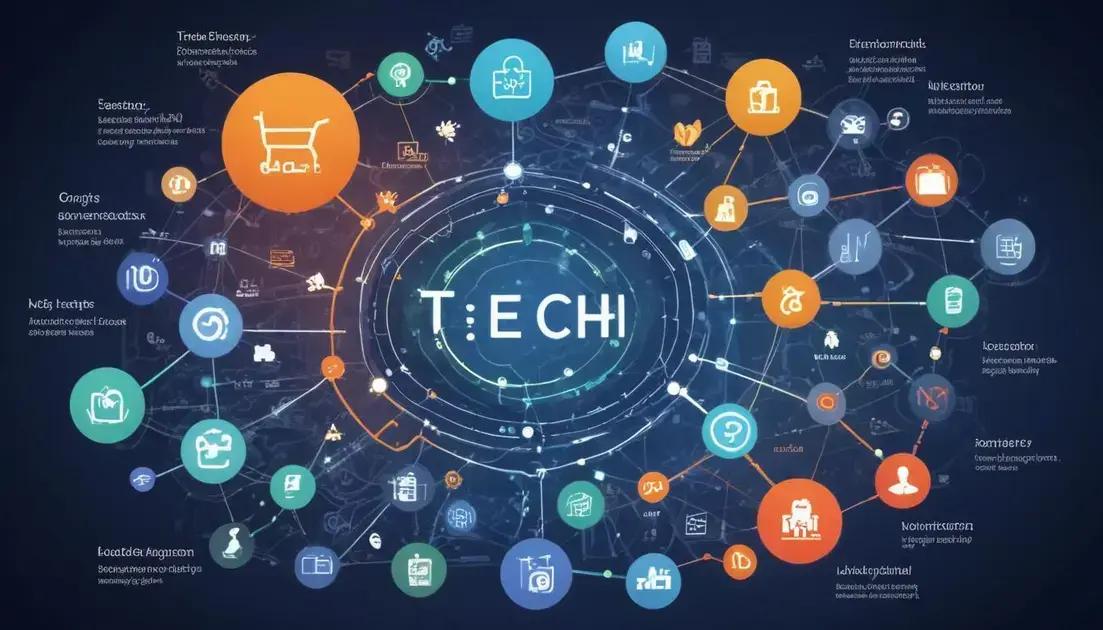Big tech antitrust cases: what you need to know
Anúncios
Big tech antitrust cases are regulatory actions aimed at preventing monopolistic practices and fostering competition among major technology firms, directly impacting the industry and consumer rights.
The world of big tech antitrust cases is buzzing with intrigue and complexity. Ever wondered how these legal battles shape the tech landscape and what it means for you? Let’s delve into the key points that matter.
Anúncios
Understanding antitrust laws
Understanding antitrust laws is crucial in today’s business landscape, especially with the rise of big tech companies. These laws are designed to prevent anti-competitive behavior and promote fair competition.
Essentially, antitrust laws aim to ensure that no single company dominates the market to the detriment of consumers and other businesses. This includes scrutinizing practices like price-fixing and monopolistic behaviors.
Anúncios
Key Components of Antitrust Laws
Antitrust laws encompass various regulations. Some key components include:
-
🚫 Prohibiting monopolies: Preventing companies from establishing monopolistic control over a market
-
🔍 Blocking anti-competitive mergers: Reviewing mergers and acquisitions that could significantly reduce competition
-
⚖️ Preventing unfair trade practices: Ensuring fair pricing and protecting smaller businesses
For more detailed information, you can visit the Federal Trade Commission.
Key players in big tech cases
When discussing key players in big tech cases, several companies and individuals emerge as significant influencers in the landscape of antitrust litigation. These players often shape the narratives and outcomes of important legal battles that can impact the entire tech industry.
Some of the most notable companies involved in antitrust cases include:
- 🔎 Google: Frequently scrutinized for its dominant position in search and advertising.
- 🍏 Apple: Faces challenges over its App Store policies and monopolistic practices.
- 📱 Facebook (Meta): Involved in investigations regarding data privacy and acquisition tactics.
Each of these companies has faced legal scrutiny for their market practices. They are often represented by skilled legal teams who work diligently to defend their interests.
The Role of Government Agencies
Government agencies also play a crucial role in these cases. The Federal Trade Commission (FTC) and the Department of Justice (DOJ) are essential in enforcing antitrust laws. They investigate allegations and bring actions against companies that engage in anti-competitive behaviors.
To gain a better understanding of their activities, visit the Federal Trade Commission for official updates.
Recent high-profile antitrust lawsuits
Recent high-profile antitrust lawsuits have captured significant media attention and are crucial for understanding the landscape of competition law. These cases often involve some of the largest tech companies in the world, highlighting the ongoing debate over market dominance.
One key case was against Google, where the U.S. Department of Justice accused the company of abusing its search engine dominance. The lawsuit claimed that Google has been engaged in unfair practices that stifle competition.
Another notable case involved Facebook (Meta), which faced scrutiny over acquisitions that were seen as attempts to eliminate potential competition. The FTC argued that these mergers could harm consumer choice.
Impact of These Lawsuits
These lawsuits can lead to significant changes in how companies operate. For example, if companies are found guilty of antitrust violations, they may be required to:
- 💼 Divest certain assets or divisions.
- 🔄 Change their business practices to foster competition.
- 💰 Pay substantial fines.
These outcomes not only affect the companies involved but can also reshape the industry as a whole. To stay informed about ongoing cases, you can visit the U.S. Department of Justice Antitrust Division.
Impact on consumers and businesses

The impact on consumers and businesses due to antitrust actions is profound and wide-ranging. These regulations aim to foster competition, which can lead to better choices for consumers and healthier markets for businesses.
When competition is encouraged, consumers often enjoy:
-
💸 Lower prices: Competition typically drives prices down as companies strive to attract customers
-
🌟 Better quality: Companies may improve their products and services to stand out
-
🛍️ More options: A diverse market allows consumers to select from various brands and offerings
For businesses, the implications can be equally significant. Antitrust laws help:
- ⚖️ Level the playing field: Smaller companies can compete more effectively against larger corporations.
- 💡 Encourage innovation: With less fear of monopoly, firms can invest in new ideas and technology.
- 📈 Provide opportunities for growth: Competitive markets incentivize businesses to expand and reach new customers.
Understanding these impacts is vital for both consumers and businesses in navigating the evolving market landscape. To deepen your knowledge, check out the Federal Trade Commission for more resources on competition and consumer protection.
Legal battles: Apple, Google, and more
The legal battles involving major tech companies like Apple and Google are reshaping the landscape of the technology industry. These cases often focus on issues related to antitrust laws, competition, and consumer rights.
Apple has faced scrutiny over its App Store policies, as developers allege unfair practices that restrict market access. This has led to lawsuits claiming that Apple monopolizes app distribution.
On the other hand, Google has been engaged in numerous legal disputes, notably regarding its search engine dominance. The U.S. government has accused Google of maintaining a monopoly, preventing fair competition from other search engines.
Notable Cases
Several high-profile lawsuits are worth mentioning:
| 📂 Case | 📌 Description |
|---|---|
| 🎮 Epic Games vs. Apple | A dispute over App Store commissions and restrictions on in-app purchases, impacting developer rights and platform control. |
| 📉 State of Texas vs. Google | This antitrust lawsuit targets Google’s digital ad practices, alleging unfair competition and monopolistic behavior. |
| 🔍 DOJ vs. Google | Filed by the U.S. Department of Justice, this case focuses on Google’s dominance in search and online advertising markets. |
These legal challenges not only impact the companies involved but also set precedents for how technology companies operate in the future. For more insights into these cases, visit the Courthouse News for updates and details on ongoing litigation.
Global perspectives on antitrust
Global perspectives on antitrust laws vary widely, reflecting different market dynamics and regulatory frameworks. Countries approach antitrust issues based on their economic conditions and cultural values.
In the United States, the emphasis is on maintaining competition, allowing for rigorous enforcement of antitrust laws. Agencies like the Federal Trade Commission (FTC) and the Department of Justice (DOJ) actively pursue major tech companies to prevent monopolistic practices.
In contrast, the European Union has been known for its strict approach to competition, often imposing hefty fines for violations. The EU’s General Court has ruled against big tech firms, emphasizing consumer protection and market fairness.
Key Differences in Antitrust Approaches
Several key distinctions can be observed:
- 🏛️ Regulatory Authority: In the U.S., enforcement is decentralized, while the EU has a more centralized system through the European Commission.
- 🎯 Focus: The U.S. tends to prioritize consumer welfare, while the EU emphasizes market competitiveness.
- ⚖️ Enforcement Actions: The EU has a history of significant fines for tech companies, encouraging compliance on a large scale.
Understanding these global perspectives is vital for companies operating internationally. For more insights on international antitrust laws, you can visit the OECD Competition Committee.
Future of big tech regulation
The future of big tech regulation is a hot topic as governments seek to address the growing influence of major technology companies. As these companies expand, regulators are considering new frameworks to ensure fair competition and protect consumer rights.
One key aspect of future regulation revolves around data privacy. With companies collecting vast amounts of user data, regulations may tighten to safeguard personal information. Ensuring transparency about how data is used is becoming increasingly important.
Another focus is on promoting competition in digital markets. Policymakers are discussing rules that prevent anti-competitive practices by large tech firms, such as preferential treatment of their products over competitors’.
Emerging Trends in Regulation
Several trends are shaping the regulatory landscape:
What it means for the tech landscape

Understanding what it means for the tech landscape is crucial as regulations reshape how companies operate. The evolving legal framework can significantly influence innovation, competition, and consumer choices.
As regulations tighten, tech companies may need to adjust their business models. This can lead to:
- 💸 Increased Compliance Costs: Companies may invest more in compliance measures to adhere to new rules.
- 🔧 Shift in Innovation Focus: Firms may prioritize projects that align with regulatory expectations, possibly stifling disruptive technologies.
- 🛡️ Greater Consumer Protection: Regulations often aim to protect users, leading to more transparent practices and improved privacy.
Moreover, the rise of regulatory scrutiny can create challenges and opportunities for smaller players in the market. Smaller tech companies may find it tougher to compete but could also benefit from a reduced threat from monopolistic giants.
Potential Industry Changes
As tech regulations evolve, some potential changes to watch for include:
- 🚀 New Market Entrants: Increased scrutiny on large firms may open the door for startups.
- 🧠 Innovation in Compliance Technology: Companies might develop new tools and technologies to meet regulatory demands.
- 🤝 Collaborative Efforts: Industry players could join forces to advocate for balanced regulations that promote innovation while protecting consumers.
To learn more about the impact of regulation on technology, you can visit the Tech Regulatory News.
In conclusion, navigating the future of big tech
As the tech landscape evolves, understanding the implications of new regulations is more important than ever. These changes aim to foster competition while protecting consumer rights, affecting how companies operate.
While big tech may face increased scrutiny, smaller companies might find new opportunities to thrive. The balance between regulation and innovation will shape the future of technology.
In this dynamic environment, companies must adapt and innovate. By doing so, they can not only comply with regulations but also lead in creating better products and services. The digital future is bright, and those who embrace change will succeed.
FAQ – Frequently Asked Questions about Big Tech Regulation
What is the main goal of big tech regulations?
The main goal of big tech regulations is to promote fair competition, protect consumer rights, and prevent monopolistic practices among large technology companies.
How does regulation impact innovation in the tech industry?
Regulation can lead to both challenges and opportunities for innovation. While it may impose compliance costs, it can also encourage companies to develop new technologies that meet regulatory standards.
What are some examples of regulations affecting big tech companies?
Examples include data privacy laws like GDPR in Europe and antitrust actions by the FTC and DOJ in the United States against companies like Google and Facebook.
How can smaller tech companies benefit from stricter regulations?
Stricter regulations can level the playing field for smaller companies by reducing the market dominance of larger firms, allowing them to compete more effectively.
Where can I find more information about tech regulations?
You can find more information about tech regulations by visiting official sites like the Federal Trade Commission (FTC) and the European Commission for updates and guidance.







